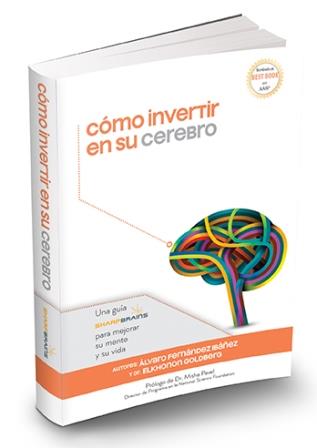Indice de Cómo invertir en su cerebro
 PRÓLOGO
PRÓLOGO
INTRODUCCIÓN
Una nueva oportunidad
Prevenir enfermedades, mejorar el rendimiento, ¿o ambos?
El objetivo de este libro
CAPÍTULO 1. COMENCEMOS CON EL CEREBRO EN MENTE
¿Qué hace el cerebro?
¿Qué hacen las neuronas?
¿Cómo se estructura el cerebro?
El cerebro a lo largo de la vida
La neuroplasticidad a lo largo de la vida:
El cerebro puede cambiar a cualquier edad, para bien o para mal
Ejemplos de neuroplasticidad
No cuente con milagros
Entrevistas:
- Dr. Robert Sylwester — Cognición y desarrollo del cerebro
- Dr. James Zull — ¿Qué es el aprendizaje?
- Dr. Michael Posner — ¿Qué es la atención y cómo entrenarla?
CAPÍTULO 2. ENTENDIENDO LA CIENCIA MODERNA
El futuro está (casi) aquí
No subcontrate su cerebro:
¿Cuáles son mis prioridades?
¿Tiene esto relevancia para mí?
Tenga en cuenta los sesgos cognitivos
El valor del proceso científico
Estudios de observación y estudios experimentales
El estudio de la BBC frente a los estudios del NIH
Entrevistas:
- Dr. Álvaro Pascual-Leone – Entender la salud cerebral para una mejor autoevaluación
- Dr. Robert Bilder – ¿Por qué y cómo cambiar el cerebro? La meditación como ejemplo
CAPÍTULO 3. MENS SANA IN CORPORE SANO
¿Cómo afecta el ejercicio físico a nuestro cerebro?
Estar en forma física mejora la salud cognitiva
Estar en forma es clave para la prevención
¿Cuánto ejercicio y de qué tipo?
Entrevistas:
- Dr. Arthur Kramer – Cuidado con llevar una vida sedentaria
- Dr. Yaakov Stern — ¿Cómo interactúan el ejercicio físico y el ejercicio cognitivo?
CAPÍTULO 4. LA IMPORTANCIA DE LO QUE COMEMOS Y BEBEMOS
Un rompecabezas
Efectos de la nutrición a corto y largo plazo
Los ácidos grasos omega‑3 y los antioxidantes
Suplementos: ¿buenos, malos o ineficaces?
¿Afecta lo que bebemos a nuestro cerebro?
Diabetes, obesidad y cognición
Entrevista:
- Dr. Larry McCleary — Una estrategia multifacética para la salud cerebral
CAPÍTULO 5. ¡OH, CUÁN LEJOS LLEGARÁS!
Beneficios estructurales del desafío mental:
Actividad mental frente a desafío mental
Desafío pero también variedad
Invierta en su Reserva Cognitiva o Cerebral
Efectos permanentes del ejercicio cognitivo
La educación y el trabajo protegen
Actividades lúdicas para aumentar la reserva cerebral:
Formación musical
Aprender una nueva lengua
¿Y qué hay de los videojuegos?
Entrevistas:
- Dr. Yaakov Stern — Cómo invertir en nuestra reserva cognitiva
- Dra. Elizabeth Zelinski — Envejecimiento saludable y mejora cognitiva
CAPÍTULO 6. ¡OH, LA GENTE QUE CONOCERÁS!
Beneficios de la interacción social
Tipos de relaciones sociales
¿Qué es lo que importa en una red social?
Ampliando su vida social:
Voluntariado
Grupos sociales
¿Y qué hay de las nuevas plataformas de comunicación social?
Entrevista:
- Dr. Oscar Ybarra — Algunas de las interacciones sociales, pero no todas, pueden estimular la cognición
CAPÍTULO 7. MANEJE EL ESTRÉS PARA AUMENTAR SU CAPACIDAD DE ADAPTACIÓN
Estrés positivo y negativo
La respuesta del cerebro al estrés
El estrés y la depresión
Cómo manejar el estrés
La meditación como técnica para aumentar la capacidad de adaptación
Entrevistas:
- Dr. Andrew Newberg – El valor de la meditación
- Dr. Robert Emmons – Aumente la felicidad y la salud cultivando la gratitud
- Dr. Brett Steenbarger — Cómo conseguir un rendimiento óptimo en profesiones de alto estrés
CAPÍTULO 8. ENTRENANDO TODO NUESTRO CEREBRO
¿Qué es el entrenamiento mental?
¿Cuál es la diferencia entre entrenamiento y estimulación mental?
¿Cuáles son las condiciones para que el entrenamiento mental funcione?
La necesidad del entrenamiento multi-disciplinar
La meditación para entrenar respuestas emocionales y atención
La terapia cognitivo-conductual para replantear procesos mentales
El entrenamiento cognitivo para optimizar funciones cognitivas y ejecutivas
La biorretroalimentación para supervisar y mejorar las respuestas fisiológicas
Análisis de los programas líderes para el entrenamiento mental
Lista de SharpBrains para evaluar opciones para la salud y gimnasia cerebral
Entrevistas:
- Dra. Judith Beck – La conexión entre el entrenamiento cognitivo y la pérdida de peso
- Dr. Martin Buschkuehl — ¿Es posible aumentar la inteligencia?
- Dr. Torkel Klingberg — Aumentando la memoria de trabajo de niños con problemas de atención.
CAPÍTULO 9. CÓMO INTEGRAR ESTA INFORMACIÓN EN SU VIDA
Cómo priorizar
Cómo autoevaluar sus creencias, conocimiento, conducta y rendimiento
Cómo desarrollar su propio plan
EPÍLOGO
APÉNDICE: 55 DATOS IMPORTANTES
ACERCA DE SHARPBRAINS
ACERCA DE LOS AUTORES
RECONOCIMIENTOS
GLOSARIO
NOTA DEL TRADUCTOR
BIBLIOGRAFÍA
